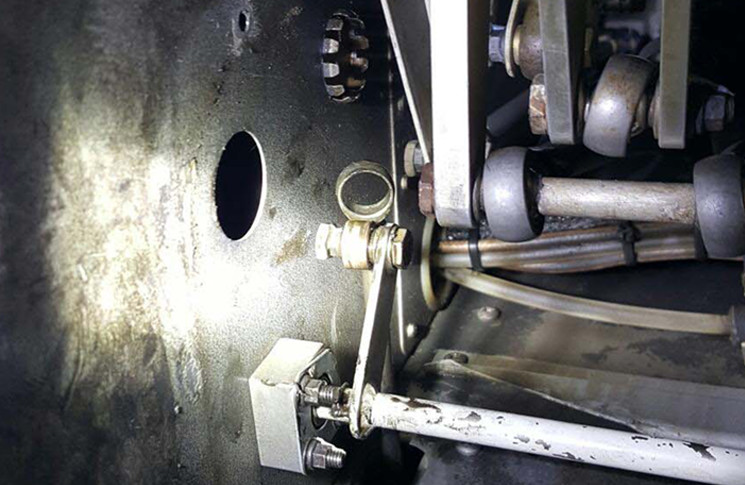Continental IO520 Reciprocating engine cylinder cracked. SDR 510023898
In flight piston engine lost power followed by uncommanded shut down after landing. Latter on , it was learned that cylinder head has cracked causing leakage of combustion gases burning ignition leads. P/No: AEC631397ST. TSN: 1165 hours
Continental IO550N Magneto/distributor—gear worn. SDR 510023680
After takeoff at approximately 100ft AGL, engine coughed once. Shortly afterwards it began running roughly. During the circuit to land back, pilot turned the magneto switch to L and the roughness stopped. Subsequent inspection of the right magneto showed the plastic distributor gear had stripped teeth. P/No: S6LSC25. TSO: 247 hours.
Continental TSIO520M Exhaust turbocharger—bearing worn. SDR 510023721
During climb, flight crew reported low manifold pressure. Following engine inspections, turbo charger compressor bearing were found worn and impeller damaged. Replacement turbocharger installed. The reason for the damage to the turbo charger could not be determined. P/No: 4066109005. TSN: 531 hours/92 months TSO: 531 hours/92 months
Lycoming IO360C1C6 Engine reciprocating—piston engine fire. SDR 510023749
Possible Engine fire on start up. Engine inspected and ground runs carried out satisfactory.
Lycoming IO360 Ignition wiring—diode short circuit. SDR 510023905
After aircraft landed, it was discovered that engine cannot be shut down through normal procedures. Through the course of troubleshooting, starter system wiring was found defective with shortened diode allowing starter to stay powered even when switched off. The aircraft has now been modified with an Engineering Order to remove the diode and wiring between the starter solenoid and the avionics master. P/No: 21PB15A.
 Lycoming IO540AE1A5 Fuel control/reciprocating engines—rod end separated. SDR 510023849 (photo above)
Lycoming IO540AE1A5 Fuel control/reciprocating engines—rod end separated. SDR 510023849 (photo above)
Throttle forward rod end at FCU found separated. Removal of the cover revealed that the swage had failed. The R44 IPC shows an A141-17 large area washer, found not installed. Other R44 II aircraft of a similar age also did not have this washer installed. Installation of this washer would have prevented a complete disconnection of the rod after the failure. OEM notified. P/No: A1273.
Lycoming LO360A1H6 Engine starter—starter motor unserviceable. SDR 510023836
While carrying out 50 hourly inspection, L/H engine starter body found loose. Starter has only accumulated short in service time. New strater fitted on the L/H engine. P/No: 149NL. TSN: 442 hours
Lycoming O320 Engine reciprocating—piston engine power loss. SDR 510023936
Reported power loss with associated inability to maintain altitude. Engine may have been operated in excess of 2700 RPM for up to ten minutes. Rectifications planned.
Lycoming O360A1H6 Fuel control/reciprocating engines—carburettor contaminated. SDR 510023844
Left engine failed to shutdown via normal procedure by moving mixture control lever to cut-off position. Engine was shutdown using magneto switches. During the course of trouble shooting, contamination (Aluminium like material) found in accelerator pump sump and idle tube assembly. Carburettor needle and seat, orifices and chambers cleaned using compressed air. Carburettor reassembled and needle leakage functional check carried out. Nil leakage evident. Left and right magnetos removed and inspected internally. Nil defects noted. Magnetos reinstalled to engine and timing reset.Engine run carried out, found satisfactory for continued operations. P/No: 106019. TSO: 14 hours
Lycoming O360A1H6 Fuel control/reciprocating engines—carburettor contaminated. SDR 510023875
Left Engine did not shut via normal shut down procedure. Engine was shut via magneto switches. During the course of troubleshooting, carburettor was found internally contaminated. Accelerator pump discharge check valve (non-return valve) plug removed, several small pieces of material found in cavity beneath valve. Damage found at valve head caused by tool slip during past installation. Valve removed and leak tested, found leaking. Material burring on valve plug thread may have contributed to the contamination. Latter on, it was established that uncontrolled entry of fuel into the Carburettor venturi appears to have been caused by the leaking accelerator pump discharge check valve. This would explain the intermittent issues of engine roughness caused by the fuel-air mixture enrichment. P/No: 106019. TSO: 20 hours

